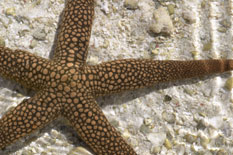Welcome to COSEE-NE’s new web page designed to provide
ocean science researchers with resources, ideas, inspiration,
and tools to become effectively involved in education and outreach.
The content on this page will be updated monthly to continue
to provide information on planning education and outreach activities.
Thinking Like an Educator
For many scientists, developing education and outreach (E&O)
activities may seem like a foreign concept. In fact, the process
that educators use to plan, implement, and evaluate E&O activities
is very similar to the process that scientists use in their own
endeavors.
In science, a new project often begins with an observation that
suggests a question to pursue. Observations in education can come
from data collected through audience needs assessments.
Learning about your audience before expending resources on a project
helps to increase both the likeliness of success and the impact
of the activity.
A new scientific idea doesn’t go forward (or get funded!)
without a review of the literature. There is also a body of literature
related to E&O, including evaluation results and information
on effective practices. Remember, most E&O project ideas are
not novel! Chances are, someone has already piloted an E&O
activity similar to the one you are proposing. It is important
to learn from the experiences of others before
starting from scratch.
While a scientist develops a hypothesis to frame the question
in a way that can be tested, educators start by determining
the goal of the project. Without the goal explicitly
stated, it won’t be possible to evaluate for success. Once
the need and the goal for a particular program have been established,
the planning and development process begins.
The actual “experiment” in the realm of E&O is
the implementation of the project. As in scientific
research, a significant amount of resources, including collaborators
with specific skills, are often dedicated to this step.
The data collection and analysis in E&O is done through the
process of evaluation. Often a professional evaluator
performs this task. Once the project has been evaluated, it is
equally important to disseminate the results so that others may
learn from the experience.
Exploring ways to fund projects that develop from the current
work is a one more parallel that science draws with E&O. For
educators, sustainability of the project or activity
is an important consideration that should be discussed during
the program planning phase.
Keeping these ideas in mind while planning your education and
outreach efforts will help to both increase the likelihood of
success as well as make the most effective use of your time and
money.
Each month, this page will provide more information on each of
these areas covered in the article above. For immediate help with
any of these areas, consult with an education and outreach expert
at your institution.
Tell us what
you think!
|
